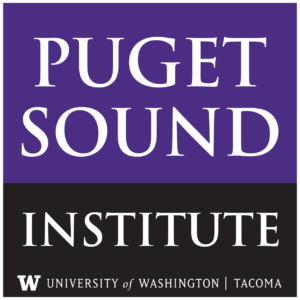A new report commissioned by the Puget Sound Institute and the Encyclopedia of Puget Sound provides the most comprehensive assessment to date of the expected impacts of climate change on the Puget Sound region. The report was produced by the University of Washington Climate Impacts Group, and is meant as an easy-to-read summary that covers […]
August 23, 2015

PSI research recognized as UW Tacoma turns 25
The Tacoma News Tribune mentions the Center for Urban Waters and the Puget Sound Institute as significant contributors to UW Tacoma’s growing reputation as a research institution. Read more in the paper’s August 22nd edition.
July 31, 2015

PSI scientist argues that African elephants are two distinct species
Will it prompt new conservation strategies? Puget Sound Institute research scientist Nick Georgiadis was quoted recently in The Guardian about increasing evidence that African elephants should be divided into two species. Georgiadis and other scientists argue that this divide creates an urgent need to reassess elephant conservation strategies. Georgiadis is co-author of a paper in the Annual Review […]
July 30, 2015

State approves human wellbeing indicators for Puget Sound
The state today adopted a series of human wellbeing indicators for Puget Sound. The project was led by PSI social scientist Kelly Biedenweg and was featured in a story published by UW News and picked up by several news outlets. July 29, 2015 Healthier Puget Sound depends on healthy people, report finds Michelle Ma from […]
July 29, 2015

Human well-being indicators in the news
KPLU reports on new human wellbeing indicators under consideration by the Puget Sound Partnership Leadership Council today. PSI Lead Social Scientist Kelly Biedenweg led the development of the indicators designed to track ways that the natural environment of Puget Sound contributes to human quality of life. Read the KPLU report online.
July 24, 2015

Auklet recordings featured on Living on Earth
The Puget Sound region is home to one of the largest nesting colonies of rhinoceros auklets in the world. Each summer tens of thousands of these puffin-like birds raise their chicks on Protection Island in the Strait of Juan de Fuca. You can listen to the sounds of this summer ritual on PRI’s Living on Earth this week. The […]
June 23, 2015

Wastewater study looks at Seattle marijuana use
One of our collaborators made news this week for his pilot study quantifying marijuana use in Seattle and Tacoma. Dan Burgard, a chemist at the University of Puget Sound, is analyzing wastewater from sewage treatment plants to identify levels of metabolized THC. The study is designed to determine if new recreational marijuana laws are leading to an increase in marijuana […]
June 18, 2015

Trade journal features Center for Urban Waters green roof
The June 2015 issue of Professional Roofing features the Center for Urban Waters green roof. Read “The beauty of a project,” by Chrystine Elle Hanus for a detailed account of some of the research led by our collaborators at the University of Washington Tacoma.
May 4, 2015

Is there a shift in the Puget Sound food web?
A Seattle Times story features a recent paper in the Marine Ecology Press Series about shifting baselines in the Puget Sound food web. Forty years of data from the Washington Department of Fish and Wildlife reveal a trend toward more jellyfish and less of some forage fish species in the region. High amounts of jellyfish can […]
February 20, 2015

In the news: Cleaning a lake with sludge
We’ve all heard of cleaning up environmental waste, but can waste be used to clean up the environment? A research team led by PSI’s Andy James is using waste product to remove phosphorus from stormwater entering Wapato Lake in south Tacoma. A group of students in collaboration with James and UWT professor Jim Gawell has […]
